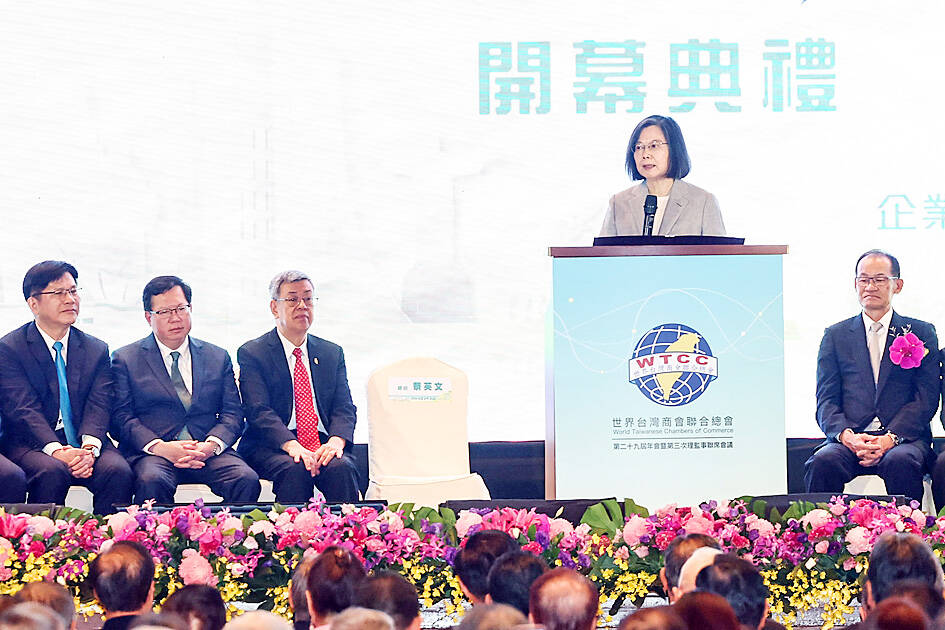President Tsai Ing-wen (蔡英文) yesterday called on overseas Taiwanese businesspeople to invest in the nation and to support Taiwan’s international participation at the annual meeting of the World Taiwanese Chambers of Commerce.
Tsai thanked overseas Taiwanese businesspeople for bolstering the economy and trade relations between Taiwan and other countries around the globe, and expressed gratitude for their charity work that has helped Taiwan and the international community.
The organization donated supplies to places in need during the COVID-19 pandemic, after Russia’s invasion of Ukraine, and after the earthquake in Turkey and Syria in February, she said.

Photo: CNA
It also donated equipment to Taiwanese search-and-rescue teams to help improve disaster prevention and relief capabilities this year, she said.
While overseas Taiwanese businesspeople help Taiwan expand economic and trade exchanges with other countries, the government is also supporting their development abroad, she said, citing the first agreement under the US-Taiwan Initiative on 21st-Century Trade.
Last year, the government launched the Central and Eastern Europe Credit Fund and Investment Fund to facilitate cooperation between Taiwan and European countries in fields such as biotechnology and electric vehicles, she said.
The investment made under the Invest in Taiwan program and repatriated overseas funds have exceeded NT$2 trillion (US$62.21 billion) in the past few years, driving Taiwan’s economic growth, she said, adding that the program is extended to next year.
Tsai called on overseas Taiwanese businesspeople to continue rallying support for Taiwan’s participation, which would enable Taiwan in international organizations to play a more crucial role globally.
Addressing the same event, Premier Chen Chien-jen (陳建仁) called on the solidarity of overseas Taiwanese businesspeople to make Taiwan an “indispensable and key force in the world supply chain.”
As the biggest organization of overseas Taiwanese businesspeople, the organization has long assisted Taiwan to advance trade relations with other countries, Chen said.
Overseas Taiwanese businesspeople are “Taiwan’s hidden soft power around the world,” building successful careers and doing good work internationally, he said.
They help cultivate Taiwan’s relationships with foreign countries, he said, adding that their contributions are well-recognized and respected.
The government is striving to support industrial upgrading, transformation and innovation as well as bolster the industrial environment and improve administrative efficiency in this post-COVID-19 era, he said.
The government also endeavors to nurture talent, especially through formulating policies on retaining foreign students, he added.
Regarding the goal of reaching net zero carbon emissions, the government promulgated the Climate Change Adaptation Act (氣候變遷因應法) this year, allocating NT$74.3 billion from this year until 2026 toward achieving such a goal, he said.
With the upgrading of the Cabinet’s Ministry of Environment and the Taiwan Carbon Solution Exchange opening last month, the government is to coordinate relevant agencies and assist the industry in pursuing the net zero target, he said.

Chinese Nationalist Party (KMT) Chairman Eric Chu (朱立倫), spokeswoman Yang Chih-yu (楊智伃) and Legislator Hsieh Lung-chieh (謝龍介) would be summoned by police for questioning for leading an illegal assembly on Thursday evening last week, Minister of the Interior Liu Shyh-fang (劉世芳) said today. The three KMT officials led an assembly outside the Taipei City Prosecutors’ Office, a restricted area where public assembly is not allowed, protesting the questioning of several KMT staff and searches of KMT headquarters and offices in a recall petition forgery case. Chu, Yang and Hsieh are all suspected of contravening the Assembly and Parade Act (集會遊行法) by holding

PRAISE: Japanese visitor Takashi Kubota said the Taiwanese temple architecture images showcased in the AI Art Gallery were the most impressive displays he saw Taiwan does not have an official pavilion at the World Expo in Osaka, Japan, because of its diplomatic predicament, but the government-backed Tech World pavilion is drawing interest with its unique recreations of works by Taiwanese artists. The pavilion features an artificial intelligence (AI)-based art gallery showcasing works of famous Taiwanese artists from the Japanese colonial period using innovative technologies. Among its main simulated displays are Eastern gouache paintings by Chen Chin (陳進), Lin Yu-shan (林玉山) and Kuo Hsueh-hu (郭雪湖), who were the three young Taiwanese painters selected for the East Asian Painting exhibition in 1927. Gouache is a water-based

Taiwan would welcome the return of Honduras as a diplomatic ally if its next president decides to make such a move, Minister of Foreign Affairs Lin Chia-lung (林佳龍) said yesterday. “Of course, we would welcome Honduras if they want to restore diplomatic ties with Taiwan after their elections,” Lin said at a meeting of the legislature’s Foreign Affairs and National Defense Committee, when asked to comment on statements made by two of the three Honduran presidential candidates during the presidential campaign in the Central American country. Taiwan is paying close attention to the region as a whole in the wake of a

OFF-TARGET: More than 30,000 participants were expected to take part in the Games next month, but only 6,550 foreign and 19,400 Taiwanese athletes have registered Taipei city councilors yesterday blasted the organizers of next month’s World Masters Games over sudden timetable and venue changes, which they said have caused thousands of participants to back out of the international sporting event, among other organizational issues. They also cited visa delays and political interference by China as reasons many foreign athletes are requesting refunds for the event, to be held from May 17 to 30. Jointly organized by the Taipei and New Taipei City governments, the games have been rocked by numerous controversies since preparations began in 2020. Taipei City Councilor Lin Yen-feng (林延鳳) said yesterday that new measures by